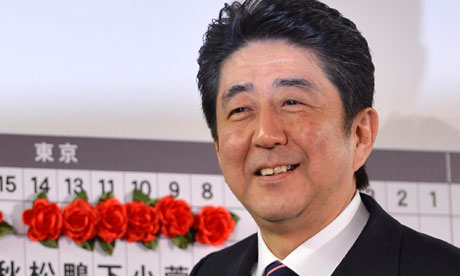 |
| Japanese Prime Minister Shinzo Abe |
Abe announced the five-year commitment of public and private support in a speech today at the Tokyo International Conference on African Development. Officials from about 50 nations are attending the meeting, held every five years, which is the biggest African development event outside the continent since it began in 1993.
Africa’s economic growth is luring Japanese exporters, while the government wants to tap the natural gas and oil there after the 2011 Fukushima disaster led to the closing of Japan’s nuclear plants. Chinese firms helped fuel $138.6 billion inChina-Africa trade in 2011, almost five times Japan’s commerce with the continent, according to the Foreign Ministry, citing International Monetary Fund data.
“China has become a far greater presence than Japan in Africa -- it’s overwhelming,” said Kazuyoshi Aoki, a professor at Nihon University in Tokyo who specializes in African matters.“The difference lies in the level of determination. There’s a different perception of Africa’s importance.”
Encourage Investment
In his speech, Abe outlined policies to encourage investment by Japanese companies and support advances in health, education and agriculture. Today’s pledge compares with publicly funded assistance of about $9.2 billion from 2008-2012.Abe hasn’t visited Africa since taking office in December, in contrast with Chinese President Xi Jinping, who stopped in Tanzania, the Congo Republic and South Africa in March as part of his first trip abroad less than a month into office.
While in Africa, Xi reiterated a pledge for $20 billion in loans over the next two years. China also paid for and built the African Union’s $200 million headquarters in Addis Ababa,Ethiopia that opened last year.
Most of Japan’s purchases from Africa consist of metals and fuels, including 10 percent of last year’s liquefied natural gas imports, according to Finance Ministry data compiled by Bloomberg. Japan exports mostly vehicles and machinery, according to the Japan External Trade Organization.
Mineral Deal
Japan is also seeking rare earth minerals and agreed with South Africa on May 16 to extend joint exploration for the elements used in manufacturing as Japan seeks to escape its reliance on imports from China.The conference renews focus on Africa as a business partner and not just an aid recipient. For the first time, corporations will be invited to an official session, Masaji Matsuyama, a parliamentary senior vice minister for foreign affairs who holds responsibility for Africa, said in an interview.
Abe will hold individual meetings with about 40 African leaders, the Foreign Ministry said. South African PresidentJacob Zuma is attending with the leaders of Uganda and Zambia.
“The number one request from African nations is promotion of trade and investment,” Matsuyama said. He said the government’s role will be to smooth the way by investing in infrastructure and sealing accords to protect private investments from the risk of sudden nationalization.
Investment Pact
Japan signed an investment agreement today with Mozambique, its first with a country in sub-Saharan Africa, the Foreign Ministry said in a statement. The accord details rules for promoting and liberalizing bilateral investment, as well as for compensation in the case of expropriation.Mozambique boasts one of the world’s largest natural gas reserves and Africa’s largest coking coal reserves, the ministry said in its statement.
Singaporean Prime Minister Lee Hsien Loong said in Tokyo last month that Japanese leaders turned their attention inward during the economic downturn, missing opportunities for overseas investment while China became more aggressive abroad.
“You have not been able to develop an overall national Japanese perspective of what is in Japan’s interests and make a decision,” Lee said. “The Chinese were able to do that.”
As an example, he said Japan is yet to sign an investment accord with the Association of Southeast Asian Nations, 13 years after announcing a plan to do so.
Asked about a rivalry between China and Japan in Africa, South Africa’s Ambassador to Tokyo said more top-level visits were needed to build relationships. Mohau Pheko told a news conference in Tokyo on May 21 that her suggestions about such trips had met with a negative response from the Japanese government.
“China does service the relationship,” she said. “Many top level visits. Japan is invisible. But you want my minerals at the same time. Terrible thing.”
Source: Bloomberg
No comments:
Post a Comment